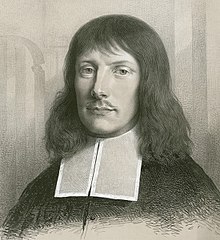Joachim Neander

Joachim Neander (* 1650 in Bremen ; † May 31, 1680 ibid) was a German pastor and hymn poet and composer . The Neanderthal and consequently the Neanderthals were named after him.
Life
Neander comes from a pastor family who, following a fashion at the time, renamed itself from Neumann to Neander ( Graecization ). He is the first son from the second marriage of his father Johann Joachim Neander (1614–1666).
He studied Reformed theology in Bremen and worked as an educator in Heidelberg and Frankfurt am Main , among others . In 1670 he came under the influence of the revival preacher Theodor Undereyck , who got him a job as tutor in a Frankfurt merchant family. Here Neander also became acquainted with Philipp Jacob Spener , whose work Pia Desideria , published in 1675, was to become the starting point for Pietism .
In 1674 Neander became rector of the Latin school of the Reformed community in Düsseldorf and assistant preacher. He wrote texts and melodies for numerous hymns that were sung at separatist edification meetings . Because Neander often composed and held church services in an impressive gorge in the Düssel river near Mettmann , Das Gesteins was named Neandershöhle in his honor and, from the 19th century, Neandertal . Since the first skeletal parts of Neanderthals were discovered there, the name Joachim Neanders can also be found in the term Neanderthals .
After Neander had problems with the church administration in Düsseldorf, he became assistant preacher at the church of St. Martini in his home town of Bremen in 1679 and lived in the Neander house , which stood east of the church and dates from the 15th century. He composed the chorale Lobe den Herren, the mighty King of Honor . After working in his hometown for less than a year, Neander died on Whit Monday, May 31, 1680 at the age of 29 or 30 from an unspecified disease (possibly from the plague). His tomb is unknown today; it cannot be ruled out that it is under St. Martini's Church.
plant
Neander is considered one of the most important Reformed hymn poets in Germany. His covenant songs and thanksgiving psalms published in 1680 were groundbreaking for the pietistic hymn books of the Reformed and Lutheran churches .
Even today's German hymn books contain songs by Neander. The Evangelical Hymnbook includes six songs, the texts and / or melodies of which he wrote, and the New Apostolic Church's hymnbook, which was in use until 2005, contains four of Neander's songs.
Neander's most famous hymn, the 1679 and 1680 sealed within the Federal songs and psalms Danck published Praise to the Lord . The melody in use today, however, was only assigned later; it is not from Neander, but is an originally secular song from the 17th century.
Remembrance day
May 31 in the Evangelical Name Calendar .
See also
List of Neander Churches
literature
- Helmut Ackermann: Joachim Neander. His life, his songs, his valley . 3rd ext. Edition Düsseldorf 2005, ISBN 3-89978-029-9 .
- Carl Bertheau: Neander, Joachim . In: Allgemeine Deutsche Biographie (ADB). Volume 23, Duncker & Humblot, Leipzig 1886, pp. 327-330.
- Thomas Diecks: Neander, Joachim. In: New German Biography (NDB). Volume 19, Duncker & Humblot, Berlin 1999, ISBN 3-428-00200-8 , p. 11 ( digitized version ).
- Gerhard Dünnhaupt : Joachim Neander (1650–1680). In: Personalbibliographien zu den Druck des Barock , Vol. 4. Hiersemann, Stuttgart 1991, ISBN 3-7772-9122-6 , pp. 2933-2936 (list of works and references).
- Lore Esselbrügge: Joachim Neander, a hymn poet of the 17th century. Diss. Marburg 1921.
- Andreas L. Hofbauer: My dove / in the rock holes / in the hidden stone cracks / let me hear your voice. Ad Joachim Neander. In: Dirk Matejovski, Dietmar Kamper, Gerd-C. Less (ed.): Myth Neanderthal. Frankfurt / New York 2001, ISBN 3-593-36751-3 .
- W. Nelle: Joachim Neander, the poet of the “Bundeslieder” and “Thanksgiving Psalms” . Hamburg 1904.
- Erich Wenneker : Neander, Joachim. In: Biographisch-Bibliographisches Kirchenlexikon (BBKL). Volume 6, Bautz, Herzberg 1993, ISBN 3-88309-044-1 , Sp. 523-526.
- Joachim Neander: Federal songs and thanksgiving psalms from 1680 with exposed basso continuo by Oskar Gottlieb Blarr . Series of publications by the Association for Rhenish Church History, Volume 79. Rheinland-Verlag GmbH, Cologne 1984, ISBN 3-7927-0810-8 .
- Joachim Neander: Covenant songs and thanksgiving psalms . Facsimile reprint of the first edition Bremen 1680 with contributions by Thomas Elsmann and Oskar Gottlieb Blarr. Schünemann, Bremen 2009 (192 and 34 pages).
- Thomas Elsmann: The posible double man! Occasional poems by Joachim Neander . In: Bremisches Jahrbuch , Volume 94, 2015, pp. 58–69.
Web links
- Literature by and about Joachim Neander in the catalog of the German National Library
- Works by and about Joachim Neander in the German Digital Library
- Works by Joachim Neander in the Gutenberg-DE project
- Joachim Neander in the Internet Archive
- Publications by and about Joachim Neander in VD 17 .
- Praise the Lord, the Mighty King . In: Popular and Traditional Songs. Historical-critical song lexicon of the German Folk Song Archive
- : Praise the Lord, the Mighty King (MIDI file of the melody at Wikimedia Commons )
- Songs by Joachim Neander at sermon-online
- Extensive biography of the Neumann / Neander family, Dutch and English
Individual evidence
- ↑ Facsimile of the copy from the Bremen City and University Library: Carl E. Schünemann, Bremen 2009, ISBN 978-3-7961-1923-1 .
- ↑ Joachim Neander in the Ecumenical Lexicon of Saints
| personal data | |
|---|---|
| SURNAME | Neander, Joachim |
| ALTERNATIVE NAMES | Neumann, Joachim |
| BRIEF DESCRIPTION | German pastor, hymn poet and composer |
| DATE OF BIRTH | 1650 |
| PLACE OF BIRTH | Bremen |
| DATE OF DEATH | May 31, 1680 |
| Place of death | Bremen |
